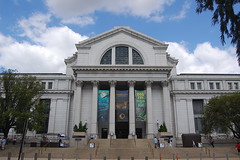 This doesn’t make money either. Photo by \Ryan on flickr. |
Why do cities keep building stadiums, despite study after study showing they don’t make money? Simple: They’re cultural amenities that people want, and are willing to pay for.
When Mayor Gray announced the DC United stadium deal last month, he kicked off a public debate about stadium-building. Much of the debate has focused on whether or not the deal will make DC any money.
The fact that stadiums often lose money is largely irrelevant. So do museums, libraries, and opera houses. Stadiums fall into the same category.
Smart communities try to squeeze some economic development out of stadium deals, because they may as well, but that’s always a side benefit. At the end of the day it isn’t the main reason cities build stadiums.
It’s true that the privately-owned sports franchises that use stadiums reap a disproportionate benefit from public financing deals, but that’s also irrelevant to the stadium-building decision. Pro sports franchises are also cultural amenities that lots of people want and will pay for.
This is why decades of policy wonk hand-wringing over the money has rarely convinced anyone to stop building stadiums. That criticism, true as it is, simply does not invalidate the perceived benefit.
 Cross-posted at Greater Greater Washington.
Cross-posted at Greater Greater Washington.
August 6th, 2013 | Permalink
Tags: development, economy, government













